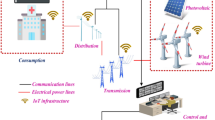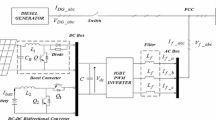Abstract
In this manuscript, an energy management system in smart grid based on internet of things (IoT) using hybrid approach is proposed. The proposed hybrid approach is the consolidation of wingsuit flying search algorithm (WFSA) and rain optimization algorithm (ROA) called ROAWFSA approach. The main aim of this work is “to optimally control the power and distribution system resources through continuously monitoring the data depends on the IoT communication scheme”. Here, the distribution system is interlinked with the data acquisition module, which is IoT object through single IP address that results in a mesh wireless network devices. The IoT-based communication framework is used to facilitate the development of demand response for the energy management system in the distribution system. This structure gathers the demand response from load and predicts the data to the centralized server. By using ROAWFSA approach, the transmitting data are activated. By this way, the IoT distribution system increases the network flexibility and gives optimal usage of the obtainable resources. Moreover, the ROAWFSA approach is reliable to meet the global supply and energy demand. The proposed method is executed in MATLAB/Simulink, and its efficiency is compared with existing methods.



















Similar content being viewed by others
Data availability
Data sharing does not apply to this article as no new data have been created or analyzed in this study.
Code availability
Not applicable.
References
Agrawal A, Sarviya R (2014) A review of research and development work on solar dryers with heat storage. Int J Sustain Energ 35:583–605
Albert A, Rajagopal R (2013) Smart meter driven segmentation: what your consumption says about you. IEEE Trans Power Syst 28:4019–4030
Amarnath D, Sujatha S (2018) Internet-of-things-aided energy management in smart grid environment. J Supercomput 76:2302–2314. https://doi.org/10.1007/s11227-018-2492-5
Anandakumar H (2019) Optimization, modelling and simulation for evolutionary computation. J Adv Res Dyn Control Syst. https://doi.org/10.5373/JARDCS/V11I9/20193161
Arun S, Selvan M (2018) Smart residential energy management system for demand response in buildings with energy storage devices. Front Energy 13:715–730
Babar M, Tariq MU, Jan MA (2020a) Secure and resilient demand side management engine using machine learning for IoT-enabled smart grid. Sustain Cities Soc 62:102370
Baroudi U, Bin-Yahya M, Alshammari M, Yaqoub U (2018) Ticket-based QoS routing optimization using genetic algorithm for WSN applications in smart grid. J Ambient Intell Humaniz Comput 10:1325–1338
Cao T, Hwang Y, Radermacher R (2017) Development of an optimization based design framework for microgrid energy systems. Energy 140:340–351
Chakraborty N, Mondal A, Mondal S (2017) Intelligent scheduling of thermostatic devices for efficient energy management in smart grid. IEEE Trans Ind Inf 13:2899–2910
Chen S, Gooi H, Wang M (2012) Sizing of Energy Storage for Microgrids. IEEE Trans Smart Grid 3:142–151
Covic N, Lacevic B (2020) Wingsuit flying search—a novel global optimization algorithm. IEEE Access 8:53883–53900
Ding Y, Hong S, Li X (2014) A demand response energy management scheme for industrial facilities in smart grid. IEEE Trans Industr Inf 10:2257–2269
Ejaz W, Naeem M, Shahid A, Anpalagan A, Jo M (2017) Efficient energy management for the internet of things in smart cities. IEEE Commun Mag 55:84–91
Elkazaz M, Sumner M, Thomas D (2020) Energy management system for hybrid PV-wind-battery microgrid using convex programming, model predictive and rolling horizon predictive control with experimental validation. Int J Electr Power Energy Syst 115:105483
Erwinski K, Paprocki M, Grzesiak LM, Karwowski K, Wawrzak A (2013) Application of ethernet powerlink for communication in a linux RTAI open CNC system. IEEE Trans Ind Electron 60:628–636
Essiet I, Sun Y, Wang Z (2019) Scavenging differential evolution algorithm for smart grid demand side management. Proc Manuf 35:595–600
Figueiredo V, Rodrigues F, Vale Z, Gouveia J (2005) An electric energy consumer characterization framework based on data mining techniques. IEEE Trans Power Syst 20:596–602
Guan Z, Lu X, Wang N, Wu J, Du X, Guizani M (2020) Towards secure and efficient energy trading in IIoT-enabled energy internet: a blockchain approach. Future Gener Comput Syst 110:686–695
Hafeez G, Alimgeer KS, Wadud Z, Khan I, Usman M, Qazi AB, Khan FA (2020) An innovative optimization strategy for efficient energy management with day-ahead demand response signal and energy consumption forecasting in smart grid using artificial neural network. IEEE Access 8:84415–84433
Han D, Sun W, Fan X (2018) Dynamic energy management in smart grid: a fast randomized first-order optimization algorithm. Int J Electr Power Energy Syst 94:179–187
Huang Y, Wang W, Hou B (2019) A hybrid algorithm for mixed integer nonlinear programming in residential energy management. J Clean Prod 226:940–948
Imran A, Hafeez G, Khan I, Usman M, Shafiq Z, Qazi AB, Khalid A, Thoben KD (2020) Heuristic-based programable controller for efficient energy management under renewable energy sources and energy storage system in smart grid. IEEE Access 8:139587–139608
Javaid N (2017) A new heuristically optimized Home Energy Management controller for smart grid. Sustain Cities Soc 34:211–227
Katyara S, Shah MA, Chowdhary BS, Akhtar F, Lashari GA (2018) Monitoring, control and energy management of smart grid system via WSN technology through SCADA applications. Wirel Pers Commun 106:1951–1968
Khan ZA, Zafar A, Javaid S, Aslam S, Rahim MH, Javaid N (2019) Hybrid meta-heuristic optimization based home energy management system in smart grid. J Ambient Intell Humaniz Comput 10:4837–4853
Laidi M (2012) Study of a solar PV-wind-battery hybrid power system for a remotely located region in the southern Algerian Sahara: case of refrigeration. J Technol Innov Renew Energy. https://doi.org/10.6000/1929-6002.2012.01.01.4
Liu Y, Yang C, Jiang L, **e S, Zhang Y (2019) Intelligent edge computing for IoT-based energy management in smart cities. IEEE Network 33:111–117
Lu R, Hong S, Yu M (2019) Demand response for home energy management using reinforcement learning and artificial neural network. IEEE Trans Smart Grid 10:6629–6639
Martins R, Hesse HC, Jungbauer J, Vorbuchner T, Musilek P (2018) Optimal component sizing for peak shaving in battery energy storage system for industrial applications. Energies 11:2048
Marzband M, Ghadimi M, Sumper A, Domínguez-García J (2014) Experimental validation of a real-time energy management system using multi-period gravitational search algorithm for microgrids in islanded mode. Appl Energy 128:164–174
Melhem F, Grunder O, Hammoudan Z, Moubayed N (2018) Energy management in electrical smart grid environment using robust optimization algorithm. IEEE Trans Ind Appl 54:2714–2726
Moazzeni A, Khamehchi E (2020) Rain optimization algorithm (ROA): a new metaheuristic method for drilling optimization solutions. J Petrol Sci Eng 195:107512
Moro J, Duarte L, Ferreira E, Dias J (2013) A home appliance recognition system using the approach of measuring power consumption and power factor on the electrical panel, based on energy meter ICs. Circuits Syst 04:245–251
Nguyen D, Le L (2015) Risk-constrained profit maximization for microgrid aggregators with demand response. IEEE Trans Smart Grid 6:135–146
Pawar P, Vittal KP (2019) Design and development of advanced smart energy management system integrated with IoT framework in smart grid environment. J Energy Storage 25:100846
Rahim S, Javaid N, Khan RD, Nawaz N, Iqbal M (2019) A convex optimization based decentralized real-time energy management model with the optimal integration of microgrid in smart grid. J Clean Prod 236:117688
Rajesh P, Naveen C, Venkatesan AK, Sha** FH (2021a) An optimization technique for battery energy storage with wind turbine generator integration in unbalanced radial distribution network. J Energy Storage 43:103160
Rajesh P, Sha** FH, Kommula BN (2021b) An efficient integration and control approach to increase the conversion efficiency of high-current low-voltage DC/DC converter. Energy Syst. https://doi.org/10.1007/s12667-021-00452-w
Roy K, Mandal K, Mandal A (2019) Energy management of the energy storage-based micro-grid-connected system: an SOGSNN strategy. Soft Comput 24:8481–8494
Said O, Tolba A (2021) Accurate performance prediction of IoT communication systems for smart cities: an efficient deep learning based solution. Sustain Cities Soc 69:102830
Sha** FH, Rajesh P, Raja MR (2021) An efficient VLSI architecture for fast motion estimation exploiting zero motion prejudgment technique and a new quadrant-based search algorithm in HEVC. Circuits Syst Signal Process 1–24
Sha** FH, Rajesh P (2022) FPGA realization of a reversible data hiding scheme for 5G MIMO-OFDM system by chaotic key generation-based paillier cryptography along with LDPC and its side channel estimation using machine learning technique. J Circuits Syst Comput 31(05):2250093
Shekari T, Gholami A, Aminifar F (2019) Optimal energy management in multi-carrier microgrids: an MILP approach. J Mod Power Syst Clean Energy 7:876–886
Silva B, Han K (2019) Mutation operator integrated ant colony optimization based domestic appliance scheduling for lucrative demand side management. Future Gener Comput Syst 100:557–568
Singh SK, Jeong YS, Park JH (2020) A deep learning-based IoT-oriented infrastructure for secure smart city. Sustain Cities Soc 60:102252
Subbaraj P, Rengaraj R, Salivahanan S (2009) Enhancement of combined heat and power economic dispatch using self adaptive real-coded genetic algorithm. Appl Energy 86:915–921
Venkatakrishnan G, Rengaraj R (2017a) Differential evolution with parameter adaptation strategy for an optimal dispatch of residential distributed energy sources. J Comput Theor Nanosci 14:5997–6002
Venkatakrishnan GR, Rengaraj R (2017b) Strategy for wind energy development in myanmar– an overview. Int J Adv Eng Res Dev. https://doi.org/10.21090/ijaerd.86529
Wang X, Zhang Y, Chen T, Giannakis G (2016) Dynamic energy management for smart-grid-powered coordinated multipoint systems. IEEE J Sel Areas Commun 34:1348–1359
Wu X, Hu X, Yin X, Li L, Zeng Z, Pickert V (2019) Convex programming energy management and components sizing of a plug-in fuel cell urban logistics vehicle. J Power Sour 423:358–366
Zhao C, He J, Cheng P, Chen J (2017) Consensus-based energy management in smart grid with transmission losses and directed communication. IEEE Trans Smart Grid 8:2049–2061
Funding
This research did not receive any specific grant from funding agencies in the public, commercial, or not-for-profit sectors.
Author information
Authors and Affiliations
Corresponding author
Ethics declarations
Conflict of interest
The authors declare that they have no known competing financial interests or personal relationships that could have appeared to influence the work reported in this paper. Authors declare that they have no conflict of interest.
Ethical approval
This article does not contain any studies with human participants performed by any of the authors.
Consent to participate
Not applicable.
Additional information
Publisher's Note
Springer Nature remains neutral with regard to jurisdictional claims in published maps and institutional affiliations.
Rights and permissions
About this article
Cite this article
Venkatakrishnan, G.R., Ramasubbu, R. & Mohandoss, R. An efficient energy management in smart grid based on IOT using ROAWFSA technique. Soft Comput 26, 12689–12702 (2022). https://doi.org/10.1007/s00500-022-07266-7
Accepted:
Published:
Issue Date:
DOI: https://doi.org/10.1007/s00500-022-07266-7




